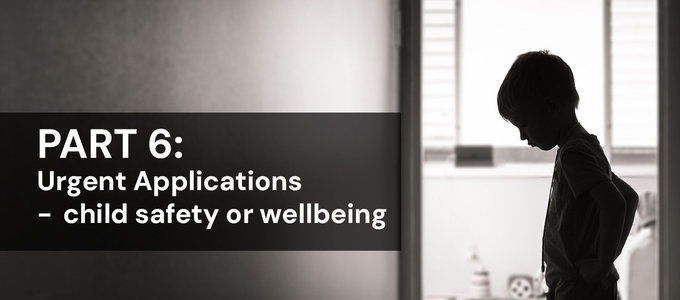Part 6: 'Children Act' Series - Urgent Applications

Though the circumstances of most cases are not urgent; there are occasions where you may want the Court to make a decision about the welfare of your child urgently. This article will focus on those applications, and the key considerations if such an application is going to be made.
What makes an application urgent?
There are several factors that could create a need for urgency. Some of the most common circumstances are as follows:
-
Where there is an immediate risk to the safety or wellbeing of a child. This can include cases of abuse, neglect, or those with threats of violence.
-
Where there is a significant risk that there will be a miscarriage of justice.
-
Where there is a risk that a child would be unlawfully taken from the UK, or a risk that a child who is outside of England and Wales will be unlawfully held in that country.
There are, broadly, two types of urgent applications:
“On Notice” Applications
These are applications in which notice is given to the respondent(s). If notice of an application is given to a respondent, they will usually be given the opportunity to appear in Court.
If you are seeking a hearing within 48 hours, you will be required to explain to the Court what efforts you have made to inform the other party of your application. To give notice, you should:
-
Write to them
-
Email them
-
Call them (if it is safe and appropriate to do so)
-
Text them
We suggest writing to or emailing the other party. Notice should only be given by text or phone in exceptional circumstances.
Once you application is issued, the Court may serve a copy of it on the other party or require you to do so. If you are required to serve the other party it is best practice to do so in writing by way of recorded delivery, alongside service by email.
“Without Notice” Applications
These are applications in which notice is not given to the other party. They can only be made in cases of exceptional urgency. Without notice hearings will usually on be held where you can evidence that giving notice to the other party would:
-
Allow them to take steps which would defeat the purpose of your application
-
Mean you or the child (or children) would be at risk of harm
-
Mean there is some other exceptional urgency which would prevent you from having time to give notice to them.
If you are considering making an urgent application to the Court, it is best practice to:
-
Give the Court as much detail about the circumstances of your case as possible
-
Set out clearly the grounds on which the application should be heard without notice, supported by evidence wherever possible.
-
Set out clearly for the Court what you think the other party would say in response to your application if notice were to be given.
-
File a written statement, signed by a statement of truth, alongside your application which sets out some background to the application, why an emergency order is required, and the nature of the order you want the Court to make.
If you are successful in obtaining an order without notice to the other party, you will likely be directed to serve a copy of the order on them. In those circumstances, you should have the other party personally served with the documents by a process server to ensure that there is evidence the documents have been received by them.
Here at Lawson West, we have a team of dedicated family solicitors who can assist you. Contact us for more information, or for a no obligation initial discussion about your circumstances.
If you believe you have a situation where you require legal advice, please contact us on telephone 0116 212 1000 or 01858 445 480, alternatively complete the free Contact Us form and we will get in touch as soon as possible.
View all

